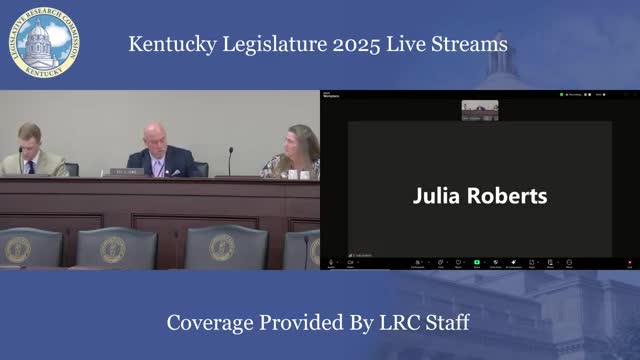Committee advances Alyssa’s Law panic‑alert plan and passes bills on reporting, gifted coursework, school calendars and school improvement
Get AI-powered insights, summaries, and transcripts
Subscribe
Summary
The House Primary and Secondary Education Committee advanced five bills Tuesday, including House Bill 14 (Alyssa’s Law), which would let districts adopt wearable panic‑alert badges that connect staff to campus offices, 911 call centers and first responders.
The House Primary and Secondary Education Committee advanced five bills during its snowy morning meeting, most notably House Bill 14 — known in the hearing as Alyssa’s Law — which would let school districts implement wearable panic‑alert badges that link staff to campus offices, 911 call centers and first responders.
Representative Kevin Jackson, the bill sponsor, told the committee, “This bill would add another valuable piece to school safety across Kentucky.” Jackson said the measure is vendor‑neutral and that districts “may, not shall, implement a wearable panic alert system” beginning in the 2025–26 school year. He and others described the devices as silent badges with a back‑button that can send tiered alerts depending on how many times it is pressed.
The bill’s proponents emphasized emergencies beyond active‑shooter scenarios. Laurie Alhadeff, founder of the nonprofit Make Our Schools Safe and mother of Alyssa Alhadeff, testified by video, saying, “Time equals life,” and urged lawmakers to approve wearable alarms that “reduce the response time of first responders.” Students and Kentucky Youth Assembly members joined the presentation and described cases in other states where rapid alerts shortened response times and helped first responders locate incidents inside large campuses.
Committee discussion of HB 14 covered funding, vendor neutrality and training. Sponsors said the draft is vendor neutral and would let the Kentucky Department of Education provide an approved‑systems list; cost estimates provided by vendors during outreach ranged from about $2 million to $6 million for a statewide campus‑by‑campus rollout, with varying ongoing maintenance fees described by witnesses. The bill as written would incentivize installation with matching funds (described in testimony as a 50/50 match) and allow leftover funding to be used for maintenance if available. Committee members asked whether the devices would work off campus and for clarification of the different alert sequences (e.g., three presses for an in‑building medical response versus eight presses for a full lockdown); sponsors said some operational details depend on vendor selection and that training requirements are written into the substitute.
Also advanced were four committee‑substitute bills:
- House Bill 48 (committee substitute): Amends state reporting language to preserve local flexibility over Comprehensive School Improvement Plans (CSIPs) and Comprehensive District Improvement Plans (CDIPs), permits districts to adopt alternative reporting methods, and directs KDE to report required timelines and to submit written inventory of reporting requirements to the Legislative Research Commission; language would cause certain reporting requirements to sunset in 2026 unless reapproved.
- House Bill 190 (committee substitute): Directs local districts to establish by Dec. 1, 2025, policies on advanced coursework or accelerated learning for grades 4–12 and allows districts to automatically enroll students who score “distinguished” in a subject into advanced coursework while retaining local discretion on opt‑outs and implementation. Dr. Julia Link Roberts of Western Kentucky University said automatic enrollment “paves the way” for more consistent access to advanced learning across districts.
- A calendar/calamity fix introduced as House Bill 241 in the hearing (committee substitute): Allows a district that follows the traditional 170‑day calendar to switch to the variable 1,062‑hour calendar for the 2024–25 school year, and directs the commissioner of education to grant up to five disaster‑relief attendance days for districts closed for health or safety reasons. Sponsor Representative Tim Truett said the change is a one‑year, targeted fix to let districts add daily minutes rather than push instruction into late June when testing and family schedules make catchup less effective.
- House Bill 298 (committee substitute): Changes how the state identifies Comprehensive Support and Improvement (CSI) schools, requiring annual identification so KDE can offer help sooner, and adds requirements for superintendent/principal collaboration on turnaround teams and professional learning for teachers in CSI schools. Sponsor Representative James Tipton said KDE has offered help to schools not formally designated CSI but that many did not request assistance; the substitute adds timelines and a role for local boards in approving turnaround teams.
Votes at a glance: the committee recorded committee‑substitute approvals and ordered all five bills to pass with committee subs attached. The clerk announced passage in each case: “House bill [number] passes with the expression of opinion that the same should pass with the committee sub attached thereto.” The transcript records roll calls on each measure; the committee’s action in each case was to pass the bill with the committee substitute attached.
Why it matters: HB 14 would create a statewide pathway for districts to adopt wearable panic alerts that proponents say shorten emergency response times. The other bills aim to reduce local reporting burdens, expand planning for advanced coursework, give short‑term calendar flexibility after disasters and accelerate assistance to low‑performing schools — all measures that sponsors framed as tools to let local districts respond to classroom and community needs.
What’s next: Each bill passed the committee with a committee substitute and will proceed through the legislative process. Implementation details (funding levels for HB 14, KDE rulemaking on approved systems, superintendent selections of materials for CSI schools, and how districts adopt advanced‑coursework policies) were left to future budget decisions, KDE guidance, or local board action.
Ending note: Committee sponsors repeatedly described their measures as preserving local control while adding state‑level options or timelines. Several members asked for follow‑up details — for example, whether panic devices work off campus and whether KDE has funds for expanded CSI supports — matters that sponsors said they would clarify as bills move forward.
